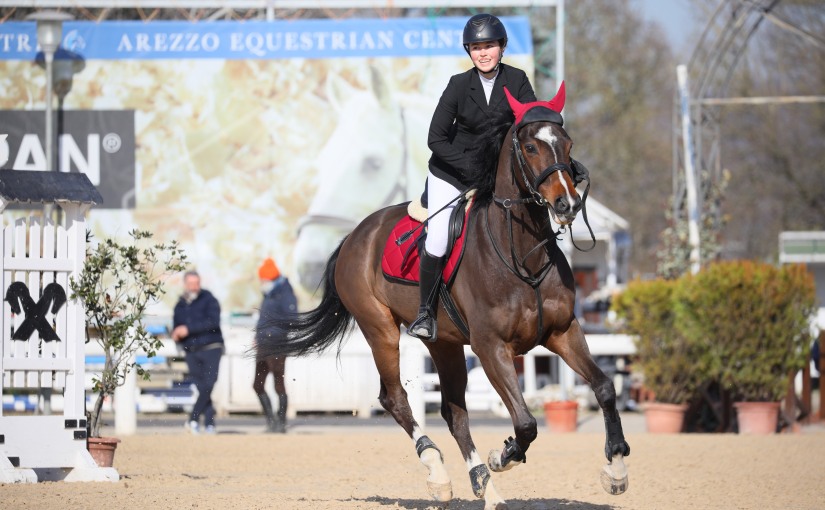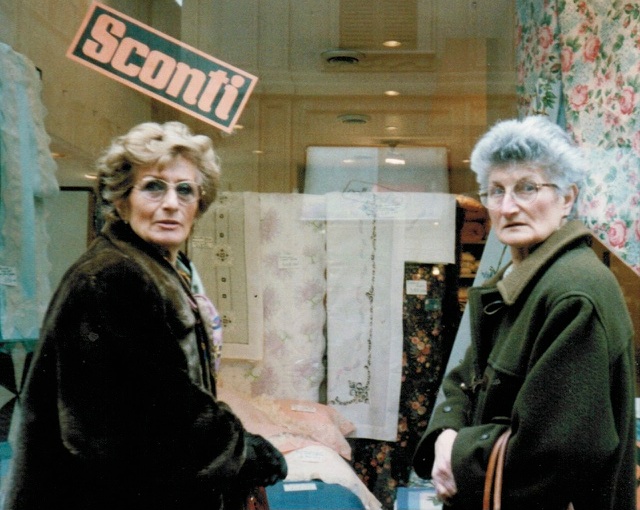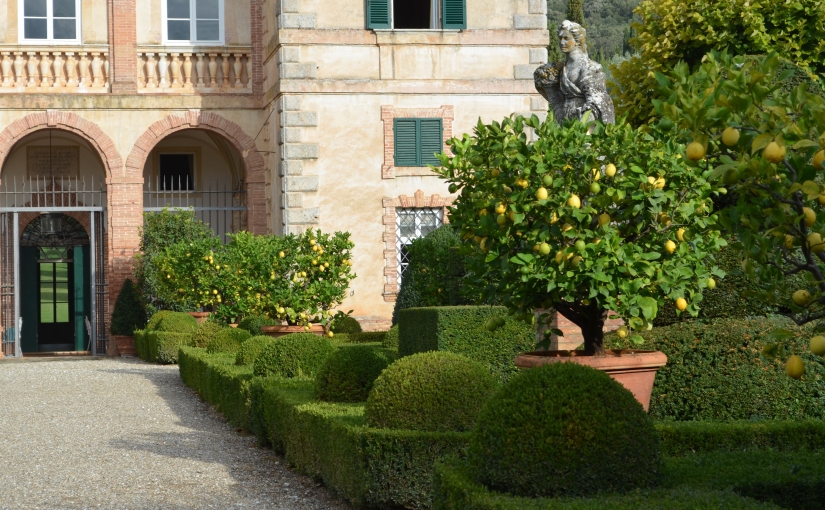At the fairgrounds, my daughter watches others compete until the last minute, and then has to rush to tack up. The sheen of her boots or whether she remembers her gloves don’t worry her—she has ridden a horse five or six days a week for most of the past decade so the ceremonial aspects barely register. In the warm-up ring, while other instructors shout last minute advice, hers—in a knobby knit hat and fluorescent sneakers—only nods. Cantering around, my daughter holds her shoulders at an angle that evokes her father, more even than the expression on her face does—one of focus on the movement, of consciousness of a flow through her and through the horse as if through one body. She jumps an oxer, then she and her horse exit the tent and cross the piazza to the competition arena.
When she was six months old, I would hand her up to her father atop King and he would ride out into the meadow, one hand holding her in the saddle and the other holding the reins. As soon as she could walk, she liked to feed King his oats, holding the bucket while he ate. Later, she rode while her father held a lead line, and soon, he unhooked the rope and she rode by herself, while he watched from the center of the paddock, the horse–mystifyingly to me–obeying the commands of those little limbs.
My sister taught me to ride when I was 7 or 8, in our paddock at home, on her Appaloosa, and until I came to Italy at the age of 31, my only other occasion to ride was an ill-conceived gallop through the Fontainebleau forest while studying in France, for which my group was upbraided by the owner of the sweat-drenched, foamy-mouth, terrified horses we had borrowed for the afternoon. Still, when I moved to Italy, I agreed to ride, if only to flank my new husband in his favorite pursuit.
That first winter, he would home from work at lunch time, and we would ride together, in the ring set up in the olive orchard, on a terrace that eventually became part of our vineyard, or we would set off through the wooded hills behind our house, our horses equally as surefooted on the wet leaves and moss-covered rocks of the outward bound stretch as over the muddied, boar-ravaged fields of the charge toward home. A mile or two from our property was a 17th-century villa and its private woods, hundreds of acres of wide trails dotted with stone grotesques, intersecting at carved grottos or archways, crowned by a hermitage at the top of a steep, rocky trail that afforded a view of the back of the villa, its formal gardens, our property lower down and the valley below, all the way to the Monte Amiata south of Siena.
My husband never said where we were headed, nor would he agree to a set time limit for our ride, thereby enhancing the sense of adventure. His horse, Russ, was skittish and reared or tried to take off if a pheasant rose from the brush, whereas mine was calm, though she tripped occasionally, due to an old injury, sending me forward hard onto her neck if I was distracted. My husband reassured me: if I stayed with her, I would be fine.
He participated in weekend shows, all over Tuscany, for which I would pack a picnic lunch while he loaded his horse and his tack into the trailer. I watched him compete in Arezzo, Migliarino and Pontedera, hanging on the ring’s barrier in wintery winds or cracking heat, Russ’s sheer size making their grace all the more moving to me. He never bothered to braid Russ’s mane, and he wore a tweed jacket rather than the regulation white britches and dark coat—and won all the same.
My (now ex-) husband learned to ride as an adult, although he had always wanted a horse, and grew up in what must be one of the most horse-loving cities in the world, Siena. He was clever and courageous with horses out of necessity: he could not afford high quality jumpers. He had bought Russ from his friend and competitor Alessandro when a stress fracture to Russ’s hind hoof was revealed: Russ might never suffer an outright injury but nor could he be sold for the mid-five figures that his breeding merited. And he bought King, an Irish thoroughbred, as a two-year old, after he had been discarded as a race horse, for a thousand euro.
Over the years, I paid close attention to horses and riders at practices and at the shows we went to, to figure out what makes for a good technique—how the rider holds herself, the angle of her back, the length of the reins, where she looks; how the horse holds its head, whether he jumps way over the rail or barely clears it, how tight his turns are. I thought that, eventually, I’d be able to comment if not expertly than at least without saying the absolute wrong thing. But whenever I’m convinced I’m watching a rider whose reins are too long and a horse that’s slow and disobedient, my daughter will say under her breath, “She’s rides well,” or “Cavallo bravissimo!” In the wine business, where I’ve spent most of my professional life, you can learn a lot through direct observation—looking, smelling, tasting. It would seem that with horses, it’s different, because after all these years, I really can’t tell the Thoroughbreds from the nags, the novice riders from the champions.
On the other hand, I’ve become an expert on fairground comforts, having figured out that Pontedera has better cappuccino but that Arezzo’s tramezzini win out. Arezzo is more chic, too, with large, sandy, white-fenced rings, snug stalls and boutiques where, as I’ve learned first hand, you can pay double for a crop to substitute the one you forget to bring.
At the barn or at shows, I try to emulate the horse moms who were or are riders themselves. I offer to comb out the tail, fasten the girth, or give my daughter a leg up. I would be proud to lead the horse around for a cool down or a warm up or, heck, a show off! But, usually, my daughter steps around me, suggests I go get a cup of coffee or reminds me to take a video when she rides, so I head out to ringside to watch the others, until my daughter enters the ring. I have seen her ride a hundred times, and yet, when they trot in, I am always struck by their beauty, my daughter’s long legs, her sharp glance and the soft curls under her hat, King’s narrow shoulders and elegant proportions, the arc of his neck—poetry in motion.




